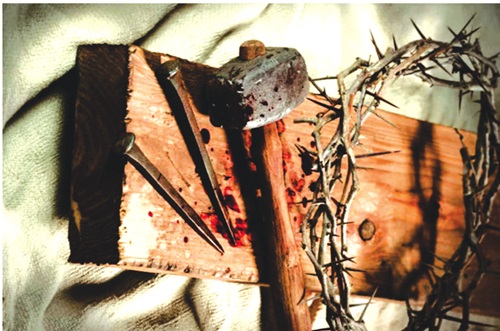
Weekend Talk: Season of crucifixions
This Easter, let’s focus on another form of crucifixion, starting with this question:
“When you received the invitation to become a believer, were you told that the invitation included being crucified?” Most likely not.
In our quest for comfort and physical well-being, we easily forget that the Christian life is a journey of self-crucifixion.
"If anyone would come after me,” Jesus told his followers, “let them deny themselves and take up their cross and follow me" (Matthew 16:24).
Self-denial and taking up our cross are like crucifixion.
As Jesus carried his cross all the way to calvary, so must we carry our cross and suffer a personal crucifixion.
Excruciating pain
Nine-inch nails drilled through his wrist and feet, a spear pierced his side, and thorns stabbed his skull.
That was excruciating pain!
Ours may be the pain of self-denial, self-discipline and material deprivation, but that is our calling to suffer for Christ.
“Calvary” is defined as “an ancient form of execution in which a person was nailed or bound to a cross.”
But the cross Jesus instructs us to take up is not ancient; it is as modern as today and tomorrow.
You will notice from the biblical narratives that unlike Jesus whose crucifixion was carried out by others, our crucifixion must be carried out by ourselves.
Ours is self-crucifixion.
The notion of crucifying oneself and dying for Christ is figurative language.
It is the high calling of our devotion to Christ and the need to conquer our fleshly desires.
As one author puts it—
“Crucifying the flesh illustrates the putting to death of selfish, sinful desires.
Believers are to take our old sin-infested nature and symbolically nail it to the cross.”
Cut them off!
So, does our eye cause us to sin by feasting on immorality and admiring what we should not be admiring? Pluck out that eye, says the Lord Jesus!
“If your right eye causes you to sin, pluck it out and throw it away. For it is better that you lose one of your members than that your whole body be thrown into hell” (Matthew 5:30).
The pain of “plucking” out an eye is like crucifying the eye.
This cannot be done literally, of course, but denying our eyes of what they desire calls for discipline that will not be pleasant but which will be spiritually rewarding.
Do our hands cause us to sin by doing wrong things and touching forbidden fruits? Cut them off! Ouch!
Do our mouths cause us to sin by insulting people, casting insinuations, uttering falsehoods, using filthy language and talking too much?
Cut off the tongue and shut up! That is painful, isn’t it? It is the pain of personal crucifixion.
How about our feet? Do they stray into slippery places, walk in step with the wicked, and stand in the company of mockers? (Psalm 1). Well then: cut off those feet!
That is why the song says, “Take my hands and let them move / At the impulse of Thy love / Take my feet and let them be / Swift and beautiful for Thee.”
Drastic measures
All these forms of spiritual crucifixions underscore the need to take drastic measures to overcome sin.
Making spiritual well-being a priority over physical well-being is the narrow path that beckons every believer.
That is to say, “Those who belong to Christ Jesus have crucified the flesh with its passions and desires” (Galatians 5:24).
Our passions and desires wage war within us, producing acts of the flesh such as sexual immorality, impurity, idolatry, witchcraft, hatred, jealousy, anger, selfish ambition, envy, and drunkenness (Galatians 5:19-21).
That is why it is misleading for anybody to tell you that following Jesus to heaven is all cozy and comfortable. Victory comes through crucifying the flesh with its passions and desires.
Narrow and broad
Those who flock to religious movements seeking only physical, material, and financial well-being should remember what Jesus said about the narrow and broad gates.
“Enter through the narrow gate. For wide is the gate and broad is the road that leads to destruction, and many enter through it.
But small is the gate and narrow the road that leads to life, and only a few find it” (Matthew 7:13-14).
While Christ’s crucifixion points us to the Kingdom of God, it also reminds us of the sacrifice our faith requires.
The apostle Paul, recognising his own need for this sacrifice, said—
“I have been crucified with Christ; it is no longer I who live, but Christ lives in me; and the life which I now live in the flesh I live by faith in the Son of God, who loved me and gave himself for me.” (Galatians 2:20).
As the resurrection followed Christ’s crucifixion, may our own sacrifice of self-crucifixion bring about renewal and spiritual awakening in our lives, this Easter and beyond.
